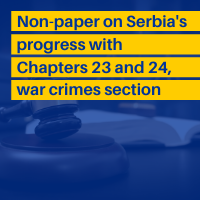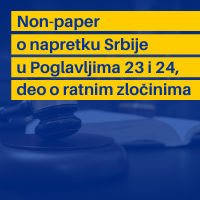The European Commission’s Non-Paper on the State of Play regarding Chapters 23 and 24 for Serbia: To overcome the legacy of the past, it is necessary to improve regional cooperation
 In June 2020, the European Commission (EC) announced its so-called “non-paper”, i.e. a semi-annual report on the current situation with Chapter 23 (Judiciary and Fundamental Rights) and Chapter 24 (Justice, Freedom and Security). Concerning the prosecution of war crimes, Chapter 23 provides for a series of measures and activities that would enable the recommendations for greater efficiency in domestic war crimes trials to be adequately addressed. The measures of the Government of the Republic of Serbia for the implementation of these recommendations are defined by the Action Plan for Chapter 23, and this semi-annual report shows whether and how much progress has made by Serbia in its implementation. The “non-paper” indicates that Serbia is still far from making progress in the field of war crimes, even though Chapter 23 was opened four years ago.
In June 2020, the European Commission (EC) announced its so-called “non-paper”, i.e. a semi-annual report on the current situation with Chapter 23 (Judiciary and Fundamental Rights) and Chapter 24 (Justice, Freedom and Security). Concerning the prosecution of war crimes, Chapter 23 provides for a series of measures and activities that would enable the recommendations for greater efficiency in domestic war crimes trials to be adequately addressed. The measures of the Government of the Republic of Serbia for the implementation of these recommendations are defined by the Action Plan for Chapter 23, and this semi-annual report shows whether and how much progress has made by Serbia in its implementation. The “non-paper” indicates that Serbia is still far from making progress in the field of war crimes, even though Chapter 23 was opened four years ago.
The EC has devoted a significant part of this report to the area related to war crimes. The report recalls Serbia’s obligation to cooperate with the International Residual Mechanism for Criminal Tribunals (IRMCT), by fully accepting its rulings and decisions. Namely, the reminder of the obligation to fully cooperate with the IRMCT is primarily related to the public challenge of the judgments of the International Criminal Tribunal for the former Yugoslavia (ICTY), but also to the non-cooperation of Serbia in relation to the arrest of indictees for contempt of court – specifically, of two members of the Serbian Radical Party, Vjerica Radeta and Petar Jojić.
Concerning regional judicial cooperation in the prosecution of war crimes, the report states that mutual cooperation remains extremely limited when it comes to war crimes cases; that cooperation with Croatia has not led to tangible results; and that Serbia has not yet enforced the judgement of the Court of Bosnia and Herzegovina (BiH) by which Novak Djukić, who lives in Serbia, was convicted.
The report further indicates that the implementation of the National Strategy for the Prosecution of War Crimes (National Strategy) has continued at a slow pace. Although this strategy expires at the end of 2020, no preparations are underway for a new strategy. It is especially emphasised that the current official reports on the implementation of this strategy fail to include recommendations on how to address the challenges in implementing the strategy.
Prompt release of information on the official website of the Office of the War Crimes Prosecutor (OWCP) is assessed as having deteriorated over the past three years.
The report also points to the statistics of the work of the OWCP, stating that the OWCP filed indictments against four individuals in 2019, of which three cases were transferred from Bosnia and Herzegovina. It also draws attention to the fact that most of the accused are low-ranking members of the police, the military, and also of paramilitary groups. Serbia continues to have more than 2,500 cases at the pre-investigation phase.
The report concludes that the authorities continue to provide support and public space to convicted war criminals, and permit hate speech. Denial of the Srebrenica genocide by certain Members of Parliament continues without consequences, and the Parliament has not taken any final decision regarding the termination of the mandate of Vojislav Šešelj, who was convicted by the ICTY at final instance.
The report concludes that meaningful regional cooperation and good neighbourly relations are needed to overcome the legacies of the past, and to constructively foster mutual trust, dialogue and tolerance in the region, avoiding actions and statements that go against this goal. This also implies honouring the victims of the past.
As for the search for persons who went missing during the armed conflicts, the report recalls that 10,027 people are still missing and unaccounted for in the region. It is emphasised that the families of missing persons still need more comprehensive support than currently available, and that the capacity of the state mechanism for searching missing persons should be further strengthened. In addition to the above, the report states that during 2019, the drafting of the Law on missing persons was initiated.
The report lists all the problems that the Humanitarian Law Center has been drawing attention to for a long time: that the implementation of the National Strategy is slow, and that although it has been implemented for more than four years, it has not achieved its goal of more efficient war crimes prosecution; that the OWCP has continued its long-standing practice of filing a small number of indictments as a result of its own investigation; that indictments are filed exclusively against low-ranking, direct perpetrators; that regional cooperation is not at a desirable level; and that the Serbian authorities reinterpret court-established facts before the ICTY and support convicted war criminals.
The conclusions of the report fully correspond to the situation in the field of war crimes prosecution in Serbia: the modest long-term results of the work of the institutions responsible for prosecuting these crimes, without activities aimed at more efficient prosecution, cannot lead to the rule of law in Serbia, reconciliation in the region and justice for victims.







